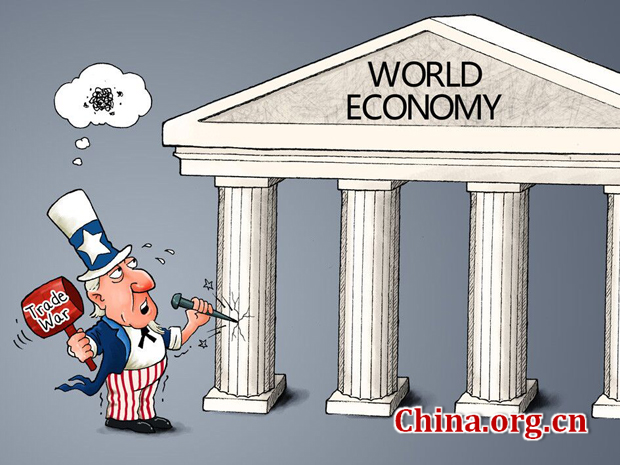Are trade wars easy to win?
- By George N. Tzogopoulos
 0 Comment(s)
0 Comment(s) Print
Print E-mail China.org.cn, August 2, 2018
E-mail China.org.cn, August 2, 2018

At the beginning of March 2018, U.S. President Donald Trump began to take action on his threat of tariffs. He then tweeted that "when a country (USA) is losing many billions of dollars on trade with virtually every country it does business with, trade wars are good, and easy to win." But is this really the case? Lessons on Sino-American trade relations learned only five months later do not necessarily vindicate the decision of the U.S. president to start a trade war.
Imposing tariffs does not always lead the other side to surrender, despite Trump's desire for them to do so. From the very beginning, China warned the U.S. that it would respond with equal tariffs, and to no surprise, this is exactly what is happening now. While the U.S. targets imports of Chinese products with sanctions, China is doing the same with imports of American products.
It is hard to assess which side will lose more during this trade war, as both are starting to feel the economic effects of the tariffs. But as far as the U.S. is concerned, Trump is taking a high risk as long as China retaliates. To start with, he has found little support for this trade war, even among Republicans. In the last few months, there was a huge Republican backlash in states with major farming industries. Now that the trade war has started, Trump recently signed a bill to help American farmers by delivering $12 billion in aid. Ironically, the U.S. president is doing exactly what he criticizes the Chinese for: offering subsidies. It is not surprising that Republican Senators remain skeptical because American farmers certainly prefer normal trade than economic assistance.
Against this backdrop, the American business community does not generally consider tariffs to be the right answer, even if it pushes China to further open up its market. In addition, big companies such as General Motors already see a rise in costs due to sanctions while American enterprises operating in China might soon be under serious pressure, as reported by CNN Money. The American media also considers the aborted takeover of NXP semiconductors by Qualcomm as the victim of trade tensions between Beijing and Washington.
More importantly, American media presents China as a country able to efficiently cope with the ongoing trade war. CNBC, for example, explains that although the U.S. market is significant for certain Chinese products, China's overall export sector is not highly dependent on the U.S. market, which accounts for 19 percent of its total exports. Among other things, the Beijing administration can strategically affect the planning of critical U.S. industries such as energy. American companies, for instance, do not want to lose Chinese clients who import liquefied natural gas. Reuters recently referred to the ability of China to influence the oil and natural gas market should its tariffs go beyond agricultural goods and automobiles.
China has accused the U.S. of launching "the largest trade war in economic history." The scope of this trade war cannot yet be anticipated. Some analysts believe the U.S. will toughen its stance in the near future following the recent agreement with the EU on the subject of tariffs. Specifically, Trump and European Commission President Jean Claude Juncker agreed in Washington to work towards zero tariffs. On these grounds, the EU is expected to import more liquefied natural gas and soybeans from the U.S. But this is a rather general framework as the European Commission does not have the power to define the choices of private companies. The Wall Street Journal's recently expressed optimism that the U.S. and the EU are building an alliance against third parties "unfair trading practices" – write China – is exaggerated.
All in all, China does not fear Trump as other countries do. The use of threats as well as the ability to negotiate are not exclusive privileges of the U.S. president. So, Beijing will remain strong, irrespective of Washington's future decisions. The trade war does not distract China's principal policy of continuing the opening-up process. The National Development and Reform Commission announced a few weeks ago a reduced list of industries in which foreign investment is limited or prohibited.
Instead of punitive tariffs generating retribution, attention should also focus on constructive economic measures. Foreign Policy magazine published an article titled: "Why China will win the trade war." This logic goes beyond China's interest because trade wars are not easy to win. The country wants to avoid this war and not be involved in order to have to win it.
George N. Tzogopoulos is a columnist with China.org.cn. For more information please visit:
http://www.china.org.cn/opinion/GeorgeNTzogopoulos.htm
Opinion articles reflect the views of their authors, not necessarily those of China.org.cn.






Go to Forum >>0 Comment(s)